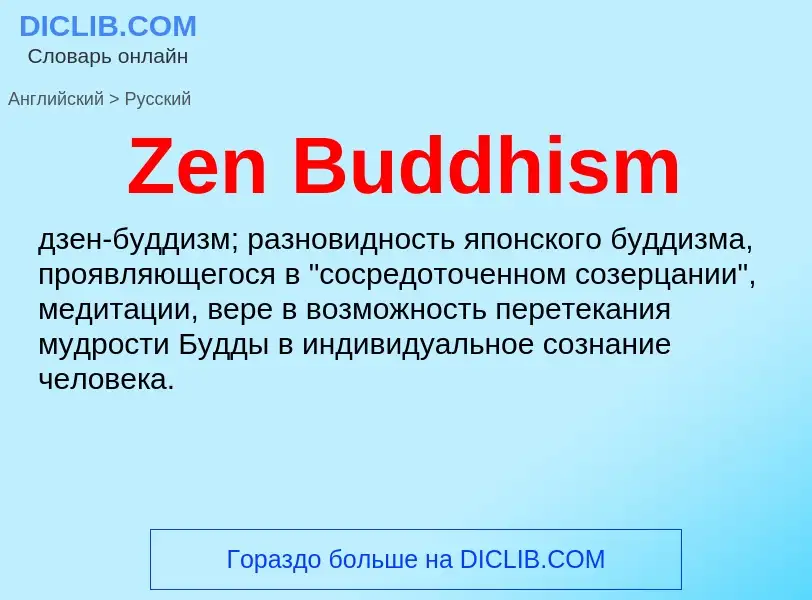Vertaling en analyse van woorden door kunstmatige intelligentie ChatGPT
Op deze pagina kunt u een gedetailleerde analyse krijgen van een woord of zin, geproduceerd met behulp van de beste kunstmatige intelligentietechnologie tot nu toe:
- hoe het woord wordt gebruikt
- gebruiksfrequentie
- het wordt vaker gebruikt in mondelinge of schriftelijke toespraken
- opties voor woordvertaling
- Gebruiksvoorbeelden (meerdere zinnen met vertaling)
- etymologie
Zen Buddhism - vertaling naar russisch
[zen'budiz(ə)m]
религия
дзэн-буддизм (разновидность японского буддизма, проповедующий медитацию, созерцание и интуицию как путь к достижению гармонии с окружающим миром)
Definitie
Wikipedia
Zen (Chinese: 禪; pinyin: Chán; Japanese: 禅, romanized: zen; Korean: 선, romanized: Seon; Vietnamese: Thiền) is a school of Mahayana Buddhism that originated in China during the Tang dynasty, known as the Chan School (Chánzong 禪宗), and later developed into various sub-schools and branches. From China, Chán spread south to Vietnam and became Vietnamese Thiền, northeast to Korea to become Seon Buddhism, and east to Japan, becoming Japanese Zen.
The term Zen is derived from the Japanese pronunciation of the Middle Chinese word 禪 (chán), an abbreviation of 禪那 (chánnà), which is a Chinese transliteration of the Sanskrit word ध्यान dhyāna ("meditation"). Zen emphasizes rigorous self-restraint, meditation-practice and the subsequent insight into nature of mind (見性, Ch. jiànxìng, Jp. kensho, "perceiving the true nature") and nature of things (without arrogance or egotism), and the personal expression of this insight in daily life, especially for the benefit of others. As such, it de-emphasizes knowledge alone of sutras and doctrine, and favors direct understanding through spiritual practice and interaction with an accomplished teacher or Master.
Zen teaching draws from numerous sources of Sarvastivada meditation practice and Mahāyāna thought, especially Yogachara, the Tathāgatagarbha sūtras, the Laṅkāvatāra Sūtra, and the Huayan school, with their emphasis on Buddha-nature, totality, and the Bodhisattva-ideal. The Prajñāpāramitā literature, as well as Madhyamaka thought, have also been influential in the shaping of the apophatic and sometimes iconoclastic nature of Zen rhetoric.
Furthermore, the Chan School was also influenced by Taoist philosophy, especially Neo-Daoist thought.

![Daehaeng Kun Sunim]], Hanmaum Seon Center, [[South Korea]] Daehaeng Kun Sunim]], Hanmaum Seon Center, [[South Korea]]](https://commons.wikimedia.org/wiki/Special:FilePath/1-법회1.jpg?width=200)
![Archaeologist [[Aurel Stein]]'s 1907 view of [[Mogao Cave]] 16, with altar and sutra scrolls Archaeologist [[Aurel Stein]]'s 1907 view of [[Mogao Cave]] 16, with altar and sutra scrolls](https://commons.wikimedia.org/wiki/Special:FilePath/Aurel Stein’s 1907 view of Mogao Cave 16, with a portion.jpg?width=200)
![Huike]] Offering His Arm to [[Bodhidharma]]'', [[Sesshū Tōyō]] (1496). Huike]] Offering His Arm to [[Bodhidharma]]'', [[Sesshū Tōyō]] (1496).](https://commons.wikimedia.org/wiki/Special:FilePath/Bodhidharma.and.Huike-Sesshu.Toyo.jpg?width=200)
![Engaku-ji temple]], the temple also has a [[Dōjō]] for the practice of [[Kyūdō]] and the Zen priests practice this art here.<ref>Hideharu Onuma, Dan DeProspero, Jackie DeProspero (1993) "Kyudo: The Essence and Practice of Japanese Archery," p. ix, Kodansha International.</ref> Engaku-ji temple]], the temple also has a [[Dōjō]] for the practice of [[Kyūdō]] and the Zen priests practice this art here.<ref>Hideharu Onuma, Dan DeProspero, Jackie DeProspero (1993) "Kyudo: The Essence and Practice of Japanese Archery," p. ix, Kodansha International.</ref>](https://commons.wikimedia.org/wiki/Special:FilePath/Bows and quivers at Enkaku-ji.jpg?width=200)
![''Chanting the Buddhist Scriptures'', by Taiwanese painter [[Li Mei-shu]] ''Chanting the Buddhist Scriptures'', by Taiwanese painter [[Li Mei-shu]]](https://commons.wikimedia.org/wiki/Special:FilePath/Chanting The Buddhist Scriptures,by Li Mei-shu.jpg?width=200)
![meditation hall]] (Jp. ''zendō'', Ch. ''chántáng'') of [[Dai Bosatsu Zendo Kongo-Ji]] meditation hall]] (Jp. ''zendō'', Ch. ''chántáng'') of [[Dai Bosatsu Zendo Kongo-Ji]]](https://commons.wikimedia.org/wiki/Special:FilePath/Dai Bosatsu Zendo Kongo-Ji 2.jpg?width=200)

![Venerable [[Hsuan Hua]] meditating in the [[lotus position]], [[Hong Kong]], 1953 Venerable [[Hsuan Hua]] meditating in the [[lotus position]], [[Hong Kong]], 1953](https://commons.wikimedia.org/wiki/Special:FilePath/Hsuan Hua Hong Kong 1.jpeg?width=200)
![Japanese Buddhist monk from the [[Sōtō]] Zen sect Japanese Buddhist monk from the [[Sōtō]] Zen sect](https://commons.wikimedia.org/wiki/Special:FilePath/Japanese buddhist monk by Arashiyama cut.jpg?width=200)
![Two grandmasters of the [[Shaolin Temple]] of [[Chinese Chan]], Shi DeRu and Shi DeYang Two grandmasters of the [[Shaolin Temple]] of [[Chinese Chan]], Shi DeRu and Shi DeYang](https://commons.wikimedia.org/wiki/Special:FilePath/Shi DeRu and Shi DeYang.jpg?width=200)
![Sojiji Temple, of the [[Soto Zen]] school, Tsurumi-ku, Yokohama, [[Japan]] Sojiji Temple, of the [[Soto Zen]] school, Tsurumi-ku, Yokohama, [[Japan]]](https://commons.wikimedia.org/wiki/Special:FilePath/Sunriseatsojiji.jpg?width=200)
![[[Thích Nhất Hạnh]] leading a namo avalokiteshvaraya chanting session with monastics from his [[Order of Interbeing]], Germany 2010 [[Thích Nhất Hạnh]] leading a namo avalokiteshvaraya chanting session with monastics from his [[Order of Interbeing]], Germany 2010](https://commons.wikimedia.org/wiki/Special:FilePath/Thich Nhat Hanh Visit EIAB 2010 Germany june retreat.jpg?width=200)


![p=wú}}) by Torei Enji. It figures in the famous ''Zhaozhou's dog'' [[kōan]] p=wú}}) by Torei Enji. It figures in the famous ''Zhaozhou's dog'' [[kōan]]](https://commons.wikimedia.org/wiki/Special:FilePath/東嶺圓慈手書無.jpg?width=200)
.jpg?width=200)
